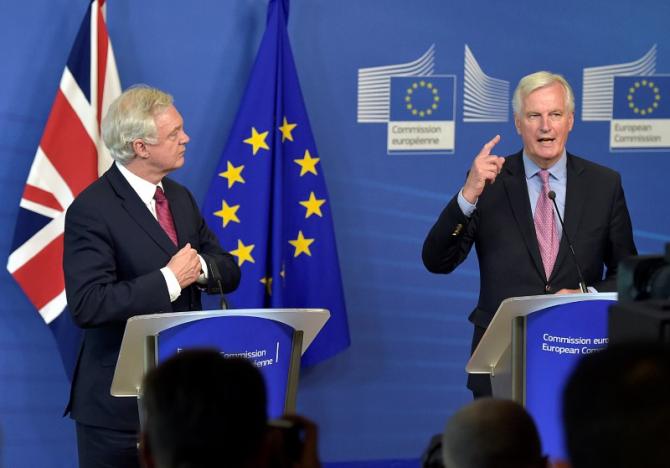The chief Brexit negotiators of the European Union and Britain began their first formal Brexit talks on Monday by underlining the need to quickly tackle uncertainties in the process and their constructive attitude to reach a deal that is good for all.
The EU’s chief negotiator, France’s Michel Barnier, welcomed his counterpart David Davis in the European Commission’s landmark headquarters in central Brussels flanked by the EU and British flags.
“Today we are launching negotiations on the orderly withdrawal of the UK from the EU,” said Barnier, a former European commissioner and French foreign minister.
Barnier said he hoped the talks, starting almost a year to the day after a British referendum vote to leave the EU, would “identify priorities and a timetable that would allow me to report to the European Council later this week that we had a constructive opening of negotiations.”
Their first task must be to “tackle the uncertainties caused by Brexit,” he said, citing the rights of EU citizens in Britain and the possible impact on the open border between Northern Ireland and the republic.
“We must first tackle the uncertainties caused by Brexit – first for citizens but also for the beneficiaries of the EU policies and for the impact on borders, in particular Ireland,” Barnier told reporters at the start of the talks.
Davis sounded a positive note too, affirming that London wanted a deep and special relationship with the EU after the divorce and that he would conduct the talks in a constructive tone.
“There’s more that unites us than divides us, so while there will undoubtedly be challenging times ahead of us in the negotiations, we will do all that we can to ensure that we deliver a deal that works in the best interests of all citizens,” Davis said.
“To that end we are starting this negotiation in a positive and constructive tone, determined to build a strong and special partnership between ourselves and our European allies and friends for the future,” he said.
MAY’S FUTURE
Last year’s Brexit vote came as a profound shock to Brussels against a backdrop of rising anti-EU sentiment, with many — including now US President Donald Trump — predicting the bloc’s eventual break-up.
May officially triggered the two-year Brexit process in March when she was riding high in the opinion polls.
She then announced — despite having ruled it out repeatedly — that she would seek a fresh mandate to give her the authority to push through a Brexit deal, or even walk away without one if need be.
But instead she lost her parliamentary majority, putting that hard-line approach and her political future in doubt after the disastrous June 8 election.
Britain appears to have given in on the EU’s insistence that the negotiations first focus on three key divorce issues, before moving onto the future EU-UK relationship and a possible trade deal.
Those issues are Britain’s exit bill, estimated by Brussels at around 100 billion euros ($112 billion), the rights of three million EU nationals living in Britain and one million Britons on the continent, and the status of the border between Northern Ireland and Ireland.
After the initial shock of last year’s Brexit vote, the bloc at 27 appears to have steadied in recent months and got a real boost with the election of new French President Emmanuel Macron in May.
